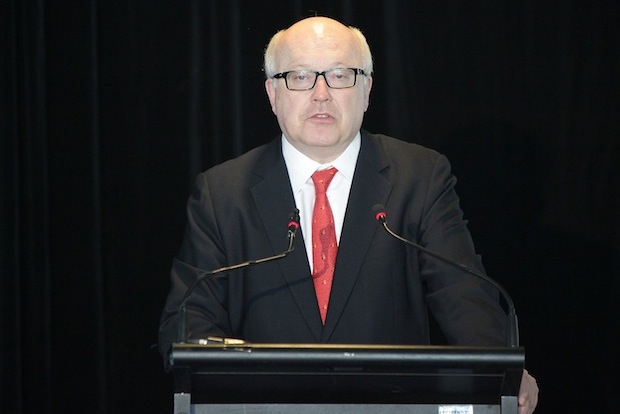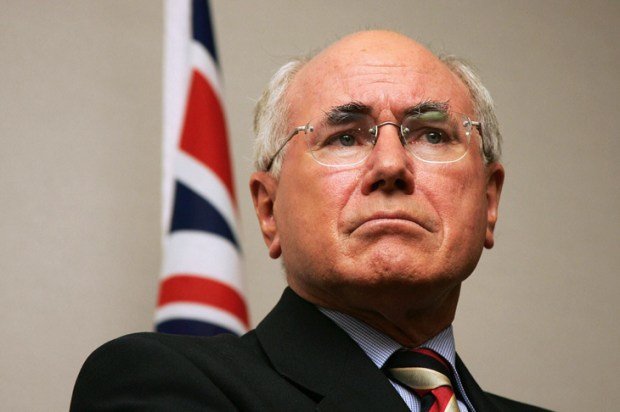Our Attorney-General, Senator George Brandis, takes more than a little pride in painting himself as an old-fashioned classical liberal. Think of the great philosopher MP John Stuart Mill and you’ll have the general idea. That is the strand of right-of-centre politics with which Mr Brandis identifies. Yet when it comes to some of the big issues of the day, our Attorney-General’s liberal scorecard ain’t good. J.S. Mill would not be impressed.
Start with the government’s push to amend the preamble to our Constitution to recognise indigenous Australians. In response to what I think are serious and valid concerns — ones, for instance, related to how future top judges might use such an amended preamble to undercut democratic decision-making — our Attorney-General responds with fatuous talk about Tony Abbott being Australia’s most authentic constitutional conservative which ‘should reassure conservative Australians that it is a change for the good’.
In other words, all us doubters should just trust Big Tony. Really? That’s the response of a classical liberal? Just trust the great man and stop thinking for ourselves? I don’t know what sort of right-of-centre voters Mr Brandis hangs out with but the ones I know tend to be (like Mill himself) fierce individualists who want arguments in favour of the policy, not appeals to reverse ad hominem fallacies and ‘we must trust you’ genuflections in the direction of the Dear Leader.Maybe that works in some of Australia’s unions these days, but if that’s the game plan for winning any upcoming referendum, then it will lose. So that’s zero for one for Brandis.
Next is the government’s pre-election pledge to make changes to section 18C of the Racial Discrimination Act, the Labor-enacted hate speech law that was used (illiberally) to go after Andrew Bolt. Now in many opinion pieces and speeches Mr Brandis has laid out his liberal credentials. He has assured us that he and this government are on the side of free speech. Indeed, that assurance was one of the bases on which I voted for the Coalition.
Alas, Mr Brandis is now purportedly leaning away from a total repeal of section 18C. Recall that this section has four triggers that undercut free speech. Those triggers are the words ‘insult’, ‘offend’, ‘humiliate’ and ‘intimidate’. These give people prepared to go to court plenty of ammunition to silence others whose criticisms they dislike (think Andrew Bolt here or Mark Steyn in Canada, where similar laws existed).
But rather than get rid of all four, and repeal the entirety of 18C (which analogously did happen in Canada federally), the talk now is of how the government might keep the prohibitory words ‘humiliate’ and ‘intimidate’ and either repeal or replace ‘offend’ and ‘insult’. Let me be blunt. Such a craven compromise is in no way at all the choice of a government committed to free speech. It basically is window dressing, leaving the Labor inroads into free speech pretty much where they are.
Try this test Mr Attorney-General. Tell us precisely what the difference is between offending or insulting someone and humiliating someone. The fact is our AG cannot differentiate them. You can’t even slide a piece of paper between these concepts. So if this government opts for this sort of half-hearted compromise, it cannot with a straight face also pretend such cosmetic changes somehow meet its free speech pledge. Same trial, same judge, same Andrew Bolt, and Bolt still loses if all that is changed is that the focus is on ‘humiliate’ rather than ‘offend’ or ‘insult’.
I won’t even bother here to do more than mention that the Attorney-General rather incredibly seems to be mooting adding, yes adding, some brand new speech-restricting criminal law provision — the old one being for him too narrowly drawn or something.
Why, you might wonder, are we hearing these backtracking noises? Alas, I fear the government just can’t be bothered to take on the vested interests. Nor is this pattern unknown with the Coalition. Labor brings in some awful law, say Victoria’s democracy-enervating Charter of Rights; the Coalition is all against it while in opposition; but cometh the day when it forms government and out the window goeth its backbone and commitment to pledges. Likewise any half-hearted treatment of section 18C would amount to much the same thing. It certainly would not amount to honouring the Abbott government’s pre-election free speech rhetoric. And it darn sure wouldn’t make Mr Brandis the heir to J.S. Mill. So that’s zero for two for the Attorney-General.
And yet there is an area where Mr Brandis has acted powerfully on behalf of freedom and deserves praise. This is his appointment of Tim Wilson as a new Human Rights Commissioner. Personally, I would have disbanded the whole Human Rights Commission, so one-sided and so slanted is it in favour of unelected judges and international elites and against elected parliamentarians. But a good second best was to appoint someone whose views are so at odds with the rest of the commission.
Of course, the inevitable complaints about how Mr Wilson was appointed emerge from executive directors of Human Rights Law Centres. These sort of people lament that Mr Brandis did not consult the commission itself in picking Wilson and that Wilson was a Liberal party member. They then roll out the usual talk of independent appointing bodies, merit-based selections and the need for a commission broadly representative of society.
Well, not to put too fine a point on it, but I can assure readers that Australia’s Human Rights Commission is in no way at all ‘broadly representative of society’ — at least not unless your only concern is skin colour and type of sexual organs. No, this commission was, and still remains, a bastion of left-wing views, pro-bill of rights beliefs, equality favouring over freedom and more. Its positions are nothing at all like those of the majority of Australians, including the over half who voted for the Coalition. And don’t forget it was this commission that backed some of the previous government’s egregious but ultimately unsuccessful proposals to undermine free speech even further.
So that’s one out of three for you Mr Brandis. Even if we count the just announced royal commission into union corruption, no doubt a good thing, that still only makes for a bare passing grade.
Got something to add? Join the discussion and comment below.
Get 10 issues for just $10
Subscribe to The Spectator Australia today for the next 10 magazine issues, plus full online access, for just $10.
James Allan is professor of law at the University of Queensland and author of a forthcoming book on democracy in decline.
You might disagree with half of it, but you’ll enjoy reading all of it. Try your first month for free, then just $2 a week for the remainder of your first year.














Comments
Don't miss out
Join the conversation with other Spectator Australia readers. Subscribe to leave a comment.
SUBSCRIBEAlready a subscriber? Log in